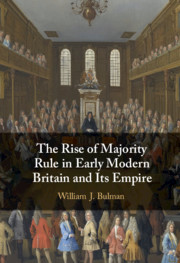‘Finally, a history of majority voting! The advent and development of this crucial yet odd feature of modern democracy has long gone unexamined. In this erudite and methodologically sophisticated study, William Bulman fully remedies this situation. The result is a must-read for historians and political scientists alike.’
Sophia Rosenfeld - University of Pennsylvania
‘With analytical precision, Bulman contextualises the origins of majoritarian processes, and makes a powerful case for grounding political history in the development of institutional practices. The result is a brilliant and powerful book, which is conceptually sophisticated and methodologically innovative, and which develops a taut, challenging and historiographically important argument.’
Jason Peacey - University College London
‘This provocative study will interest historians and modern political observers alike, forcing us to rethink what we thought we already knew. Bulman renders puzzling and historicizable what has seemed obvious eternal truth - that majority voting is the inevitable way that political bodies make decisions.’
Rachel Weil - Cornell University
William Bulman’s book can offer … a great place to start thinking about how majority rule originated. Bulman has written an intellectually formidable and smartly argued book that every American political scholar can read profitably as we reflect on the current crisis of majority rule in the Republic.'
Jack N. Rakove
Source: Reviews in American History
‘William J. Bulman’s ambitious and extraordinarily successful monograph … will both enlighten the specific scholarly audience to which it is directed and delight the larger community of historians who admire work that does not cut corners or simplify developments to achieve a wider audience.’
Jack P. Greene
Source: The American Historical Review
‘Bulmans book gives very welcome attention to the history of institutions and mundane political practice. The diligence and depth of the research he has undertaken on 16th- and 17th-century parliamentary practice is extremely impressive, and it will encourage a more creative understanding of the interaction of parliamentary forms and political outcomes.’
Paul Seaward
Source: Parliamentary History
‘[A] superb piece of work, an intellectual triumph, that firmly places the practice of politics and institutions back where they belong, at the forefront of historical debate. … Bulman has crafted a book that will become compulsory reading for everyone interested in the field and how legislature politics operates, then and now.’
Chris R. Kyle
Source: Journal of British Studies



